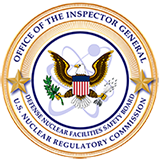Robert J. Feitel, Inspector General for the Nuclear Regulatory Commission and Defense Nuclear Facilities Safety Board, along with members of his staff visited the San Onofre Nuclear Generating Station (SONGS) on July 15. After a tour of the plant, now in the decommissioning process, Mr. Feitel and staff met with members of the California Coastal Commission (CCC) to discuss their concerns about coastal storage of nuclear waste.
“It was very fruitful,” Mr. Feitel said of the meeting, which was part of his first official trip as NRC Inspector General July 13–16. “I think the CCC members felt heard, which is something that may have been lacking in the past.”
The CCC urged the IG to seek counsel from unbiased scientists and amplify to Congress the inherent risk involved with not providing a long-term storage facility for spent nuclear fuel. They emphasized that interim spent fuel storage installations (ISFSIs) in coastal regions, particularly those in California, are even riskier than others elsewhere because of the corrosive effects of humidity and salinity, the rising sea level, and seismic activity including tsunami potential. Their main fears included spent fuel cannister cracking due to an earthquake and the blockage of cannister cooling vents in the event of a flood.
The group met after touring the ISFSI at SONGS and parts of the plant and before viewing the sea wall that separates the plant’s 85-acre concrete footprint from the beach. During the tour, the group also viewed some of the in-progress onsite building demolition and the 35-feet-deep spent fuel pools.
The CCC’s concerns echoed those of California Congressmen Mike Levin and Scott Peters, who with their staffs met in person in San Diego with Mr. Feitel and the OIG group on July 14. They stressed to the IG that spent fuel storage is the most difficult issue they face because it is a symptom of a bigger problem: no one can agree on where to send the waste for permanent storage. The congressmen encouraged the OIG to act administratively with the NRC on the issues while they act legislatively through Congress.
Once back from their trip, Mr. Feitel and staff met via Microsoft Teams with several members of Public Watchdogs, a California advocacy group likewise concerned about ISFSI sites and the validity of some NRC regulations, particularly the 2.206 petition request process.
As a result of these meetings, Mr. Feitel has implemented a plan to investigate decommissioning sites and issue a series of public, interim reports that will focus on topics such as the 2.206 petition process; flooding, seismic, and tsunami risk; the integrity of cannisters and the company that designed them; the management of aging infrastructure; and the potential fear of retaliation experienced by licensee employees. Our first report on this topic should be issued at the end of calendar year 2021.
“This will be a long but important road,” Mr. Feitel said, “and I plan to give it the staff and attention it deserves.”

